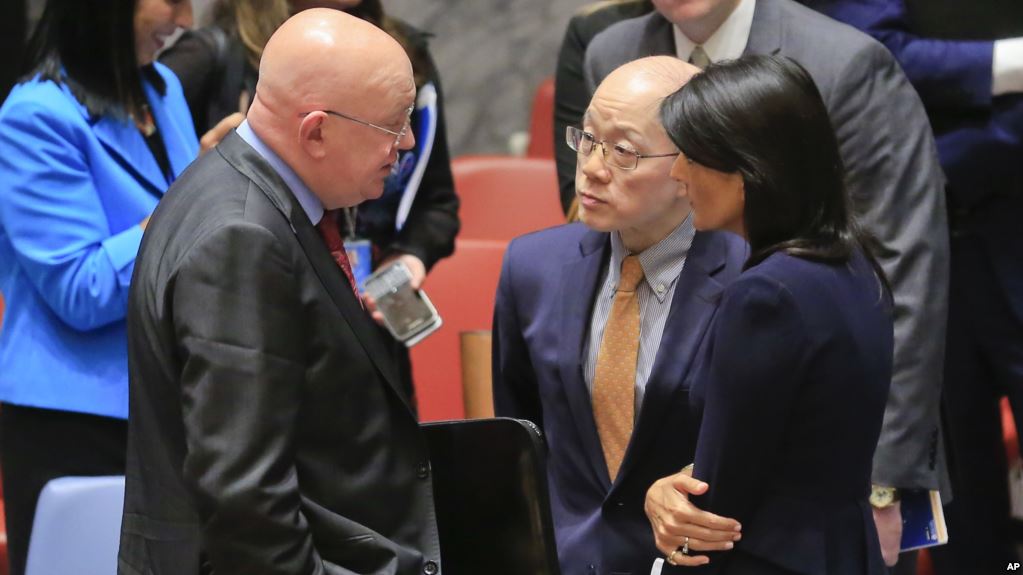
US President Donald Trump personally appealed to Chinese leader Xi Jinping to turn off the oil tap during a phone call after nuclear-armed North Korea launched a new intercontinental ballistic missile.
"That would be a pivotal step in the world's effort to stop this international pariah," US ambassador to the United Nations Nikki Haley told an emergency meeting of the UN Security Council on Wednesday.
China has gone along with a series of punitive UN measures against its Cold War-era ally, but it has resisted calls to shut the "Sino-DPRK Friendship Oil Pipeline".
US threatens to 'utterly destroy' North Korea regime
Washington had already sought an oil embargo after North Korea conducted its sixth and most powerful nuclear test in September, but faced resistance from China and Russia.
Instead, the US settled for UN sanctions that limited exports of refined petroleum products to North Korea.
So why is China so reluctant to completely cut off the steady flow of petroleum into North Korea's fuel tanks?
No one really knows. China has not published data on its oil exports to the North since 2014.
The US Energy Information Administration estimates that the country consumes only a small amount: around 15,000 barrels a day.
The majority of that likely comes from China. According to UN customs data, China sent 6,000 barrels a day of oil products to North Korea in 2016.
Crude oil flows across the Yalu River from the Chinese city of Dandong to the Sinuiju oil depot in North Korea through the 30-kilometre (18-mile) "Sino-DPRK Friendship Oil Pipeline".
US believes it can defend against North Korea missiles, for now
The pipeline went into operation in 1975 with a capacity of three million tonnes per year, but the China National Petroleum Corporation said in 2015 that annual capacity stood at 520,000 tonnes.
The majority of that oil, if not all of it, is used by the military and Pyongyang's nuclear and missile programme, according to Wang Peng, a Korea expert at China's Charhar Institute.
"I suppose there would be nothing left after the troops are finished. I don't think ordinary people can take a share," Wang told AFP.
China fears that stopping the flow of energy could trigger the collapse of the North Korean government or provoke a violent response from Pyongyang, said Daniel Russel, senior fellow at the Asia Society Policy Institute.
"There is no way the Chinese will turn off oil shipments. They have been very clear about that," Russel told AFP.
"I think Xi Jinping is moving on a much slower timeline because his priority is avoiding chaos, not avoiding a nuclear capable-ICBM," he added.
N Korea fires ballistic missile
Beijing is likely unhappy with Kim Jong-Un but it fears that the collapse of his regime would trigger a flood of refugees across its border and eliminate a strategic buffer separating China from the US military in South Korea.
Beijing is wary of cutting off oil because the move would "utterly destroy ties" with its neighbour, Wang said.
China was more likely to "kick the ball back to the US" rather than take immediate action as a direct response to the latest missile threat, he said.
"I think that Beijing definitely cannot make up its mind to (cut off oil) because it's unsure whether China is able to manage the consequences and chain reaction of outcomes of completely cutting ties," he explained.
1731570357-0/elon-musk-(1)1731570357-0-405x300.webp)
-(1)1717678110-0/Kendrick-(1)-(1)1717678110-0-165x106.webp)





1732445375-0/Untitled-design-(9)1732445375-0-270x192.webp)


1732428810-0/Copy-of-Untitled-(3)1732428810-0-270x192.webp)






COMMENTS (1)
Comments are moderated and generally will be posted if they are on-topic and not abusive.
For more information, please see our Comments FAQ